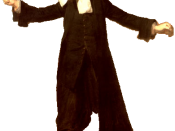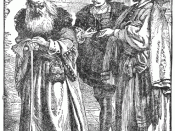Shylock's Downfall: The Merchant of Venice
By Raghav Kaushik [KorektPhool]
In Shakespeare's play The Merchant of Venice, the character of Shylock is partially responsible for his own downfall. Shylock is a victim of a society that values trade over human life; he falls foul to a city that regards Jews such as himself as inferiors; and even the intricate details of the law plays a part in his demise. It is true that Shylock feeds fat to the fire by treating the Christians with contempt; and his strong determination to dispose of his rival Antonio ultimately backfires upon himself. However, one does feel that the antagonist's attitude and behaviour towards the Venetian populace reflects the very treatment he receives from the Italians.
The Jewish antagonist is Shakespeare's most believable character in all his plays. Unlike other villains in the literary genius' other works, Shylock is not to be passed as a rogue fully responsible for his demise at the end; instead many factors affect his collapse and these issues are deeply rooted in the themes of The Merchant of Venice.
Shylock is an unfortunate scapegoat of a city that treasures business over human life. In Scene 3 of Act 1, the bond that eventually leads to Shylock's ruin is made. It is a ploy to do Antonio harm: "If I can catch him once upon the hip, / I will feed fat the ancient grudge I bear him." Shylock explains a few lines earlier that this resentment towards Antonio was because the latter was depriving the usurer of business by lending out his monies gratis. It is apparent from that scene that a fiery personal dispute has emerged from a business matter. This illustrates that fact that Venetians are prepared to do anything for the sake of trade. In...



Similarity of Titles
This is the second time in the past couple of days that I've read one of your essays on this subject (the first essay which I rated as good was ""Shylock's Downfall". To what extent is Shylock responsible for his downfall in the play The Merchant Of Venice?" The similarity of the titles might be confusing to some. Specific titles geared to the differing content would have been better.
9 out of 9 people found this comment useful.